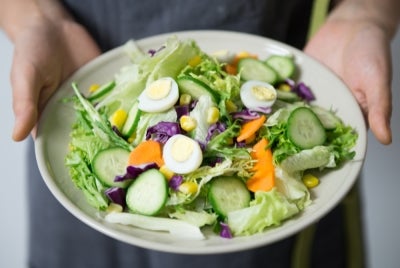Food trends are shaped by consumers, not just stores
With busy schedules packed with work, study and social lives that seem to be in constant motion, it’s no surprise that this generation’s approach to food is as fast-paced and pragmatic as their lifestyle.

For Gen Z, it’s part of a much bigger picture, a picture defined by speed, convenience and increasingly, health-conscious choices, though often with an eye on time over perfection.
With busy schedules packed with work, study and social lives that seem to be in constant motion, it’s no surprise that this generation’s approach to food is as fast-paced and pragmatic as their lifestyle.
The Gen Z food trend isn’t about slaving over the stove but rather mastering the art of grabbing, popping something in the microwave, and moving on to the next task.
But what does this mean for nutrition?
According to Clinical Researcher and Registered dietitian Dr Syamimi Samah, Gen Z’s preference for frozen, microwaveable and ready-to-eat meals stems from their desire for convenience, but these options often lack nutrient density.
She said ready-to-eat meals are usually high in preservatives, added sugar and sodium, and can be deficient in essential vitamins and fibre.
“These foods generally fall short of the balanced nutrition found in home-cooked meals, which offer better control over ingredients and portion sizes.
"To ensure adequate nutrition, it’s important to choose high-quality, minimally processed options and supplement these meals with fresh ingredients whenever possible,” she said.
Research has found that Gen Z spends more time scrolling through social media than they do cooking a meal.
With about 30 per cent more likelihood than other generations to opt for frozen or microwaveable meals, they are embracing instant gratification, where convenience and nourishment do not always go hand in hand.
Gone are the days when cooking was a social or creative experience.
Today, if a meal can be ready in minutes with minimal effort, it’s a winner.
PROCESSED BUT PERSONALISED
Gen Z’s love for convenience doesn’t necessarily translate to complete nutritional neglect.
Yes, many turn to frozen meals, ready-to-eat snacks and grab-and-go protein bars—but there’s a shift towards healthier, more informed choices.
Nutritional labels are often scrutinised, and while fast food or ultra-processed options have their place, there’s also a rise in plant-based alternatives, organic snacks and “functional” foods that promise more than just filling you up.
In a world of seemingly endless options, the challenge isn’t just about finding something quick—it’s about finding something that makes you feel good.
For Aireen Raihana Mustapha, 17, a meal can sometimes mean a sandwich or pre-cooked meal from her favourite convenience store.
“If I am hungry and on the go, this is the fastest option.
"My goal is always to feed myself, and I’m not really bothered for it to be fancy. I just need it to be hot and something I can eat while doing stuff,” she said.
However, Aireen said she does try to find healthier alternatives whenever she can.
“It’s not instant noodles every day, because I do know that, nutrition-wise, it’s not the best.
"But once in a while, it’s like a treat. My mum does lecture me on my eating habits,” she said.
More and more, this generation seeks out food that supports their busy, active lives.
Nutrition isn’t simply about calories anymore; it’s about fuelling your mind and body, often in bite-sized, portable servings.
Health isn’t always defined by the “right” meal but by the choice that balances convenience and quality.
Syamimi added that there are many healthy convenience food options available, such as balanced poke bowls, salad bowls and mixed rice, which can provide a complete, nutritious meal when chosen wisely.
“Gen Z should be more mindful of their food choices and prioritise nutrition, even when opting for convenience,” she said.
Referring to the Malaysian Healthy Plate Guide, particularly the 'Suku Suku Separuh' method, Syamimi said this can help them make more balanced decisions.
“For those who enjoy meal prepping, preparing meals on weekends or during free time is a great way to ensure balanced meals throughout the week.
Additionally, choosing meal kits or nutritious ready-to-eat options from trusted brands provides a practical solution for quick and healthy meals," she said.
THE INFLUENCE OF SOCIAL MEDIA
The rise of TikTok and Instagram influencers sharing “easy hacks” for meal prep and nutrition isn’t just a trend—it’s become a movement.
Gen Z is particularly tuned into how food can be both Instagram-worthy and healthy.
While they embrace wellness, body positivity and mindful eating, they also recognise the need for balance.
You can’t live on smoothies alone, but indulging in the occasional pizza is perfectly fine.
Like everything else, food is about balance.
Syamimi said it is important for Gen Z to empower themselves with knowledge.
While viral recipes and the latest food trends can be exciting and inspiring, it’s important to remember that not all of them are backed by science.
“Many of these trendy diets are actually fad diets, and they can be harmful to their health in the long run.
“Always turn to registered dietitians and trusted health organisations for advice."
Syamimi urged youngsters not to fall for catchy labels and to research ingredients to understand what they are feeding their bodies with.
"Always refer back to reliable guidelines, like the Malaysian Dietary Guidelines by the Ministry of Health to make choices that truly support your health.
"By staying informed and mindful, you can enjoy the fun of food trends while still taking care of your well-being,” she said.
Ammar Muhaimin, 19, said he loves watching food influencers like Khairul Aming teach simple recipes.
“I learnt a lot of simple recipes from him, so I no longer have to rely on outside food if my mum is not around.
“I can whip up a simple meal for myself,” he said.
Cooking influencers like Khairul Aming have had a significant impact on Gen Z’s eating habits, reshaping how they approach food, cooking and nutrition.
These influencers blend creativity with relatability, making cooking more accessible and exciting for a generation that values convenience but still seeks meaningful engagement with their food.
Khairul Aming, in particular, has redefined what it means to cook at home by focusing on simple, quick and visually appealing recipes.
His easy-to-follow videos and the use of local ingredients resonate with Gen Z’s love for both culture and convenience.
The fact that he often showcases recipes that are both affordable and fast allows Gen Z to see that home-cooked meals don’t have to be time-consuming or complicated.
For Gen Z, who gravitates towards fast solutions, seeing someone like Khairul make cooking approachable and fun is a game-changer.
So, what does the future of food look like for Gen Z? It’s a world of technology-driven, health-conscious and time-sensitive eating.
It’s food that fits into their world.
A world where speed, mindfulness and convenience coexist.
And while the microwave meal might be the current hero, there’s no doubt that Gen Z is reinventing the narrative.
They might not be cooking from scratch every night, but they’re thoughtful about their choices, conscious of their health and never willing to settle for just any meal.
Download Sinar Daily application.Click Here!















